The Inhumans: By Right of Birth is a Marvel graphic novel written by Ann Nocenti and Lou Mougin, illustrated by Bret Blevins and Richard Howell; inks by Al Williamson and Vince Colette, and colors by Michael Higgins and Richard Howell. In was first published in 1988 and then reprinted in 2013.
It’s still in print and available at most comic stores as well as amazon.com.
For those of you relatively new to The Inhumans, the characters encountered in the tale may seem quite different to those who currently populate the contemporary Marvel Universe. Yet the general feel is very much there. It’s as an essential Inhumans tale as I can think of; and was actually the first Inhumans book I’d read as well as the comic that forever hooked me on these wild and bizarre heroes.
The story takes place shortly after The Inhumans had relocated their home of Attilan from the Himalayan Mountains to the blue area of the moon. Generations of living in seclusion had left the Inhuman peoples especially vulnerable to the increasing levels of pollution in earth’s atmosphere, a result of the industrialization of the human world. With the assistance of Reed Richards and the Fantastic Four, the entire city of Attilan was transported to the oxygen rich blue area of the moon.
Having relocated to the moon, the Inhuman of Attilan enjoyed an unprecedented period of peace and security. They were no longer living in constant fear of being discovered and invaded upon by the human world. In as such, the populace of Attilan no longer felt as reliant on the Inhuman Royal Family so to offer protection. And this allowed the Genetic Council to garner a much more significant sway over the governance of Attilan.
The Genetic Council were the keepers of culture and ritual on Attilan. They controlled the rights of Terrigenesis and enforced a strict policy of eugenics, shaping bloodlines and arranging marriages all in an effort to control Terrigenesis and produce Inhumans who would receive fortunate gifts from the mutagenic properties of the Terrigen Mists. Their control over the Inhumans of Attilan was total and many felt constrained by the inflexible confines of their culture. Indeed the beginning of the tale introduces us to an Inhuman youth named Tally who commits suicide because she is so distraught over being forced to marry a fellow Inhuman whom she did not love.
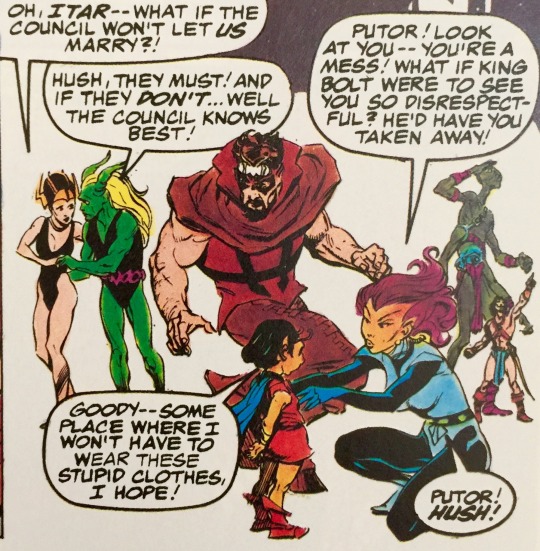
This sense of conflict on Attilan extends to the Royal Family as well. Karnak argues that the rules the Genetic Council is strangling Attilan with its staunch rules and unflinching demands. He feels that Attilan must progress beyond the old ways less they all degenerate into inbred, witless drones of culture and tradition. Gorgon disagrees with Karnak; he demands that the Council is wise, that they have guided the Inhuman peoples well. The dueling views of Karnak and Gorgon represents the growing divide on Attilan, the schism between those who adhere unwaveringly to the idioms of Attilan’s culture and those who wish to be free of the old ways.
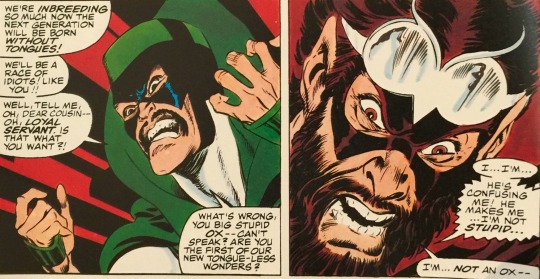
The narrative switches to Queen Medusa, tentative to share some very special news with her husband, Black Bolt. Akin to Karnak, Medusa also feels conflicted over the stringent traditions of Attilan. She has spent time in the human world as a member of the Fantastic Four and a part of her still longs for the adventure and freedom of her life before she became a wife and queen. Yet she has more important matters on her mind… She recently discovered she is pregnant with Black Bolt’s child.
Black Bolt is initially surprised, even shocked by this revelation, but the initial trepidation quickly gives way to joy on the part of the silent king over the prospect that he and his wife will soon have a child. Blevins and Howell do a wonderful job depicting Black Bolt’s reactions. He is unable to speak and hence everything must be relayed by way of body-language and facial expressions. The artists do fantastic work with it… there’s one panel in particular where the mixed feelings of happiness and anxiety is so evident on Black Bolt’s face. It’s quite well done.
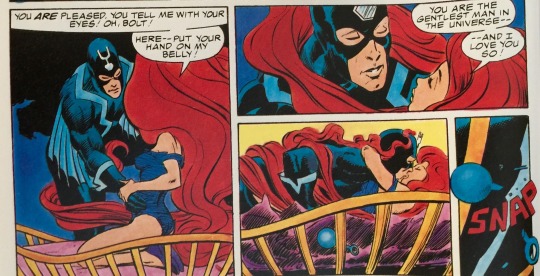
The next day, The Royal Family presides over a meeting in which the council are called to answer for as rash of suicides among the younger generation of Inhumans. Medusa steps forward and speaks for her husband, relaying his words as though they were her own. She talks about how the customs of Attilan has acted to make the Inhuman people strong and resilient… how it has helped them rise up from the servant race the Kree had created them to be and carve out their own destiny.
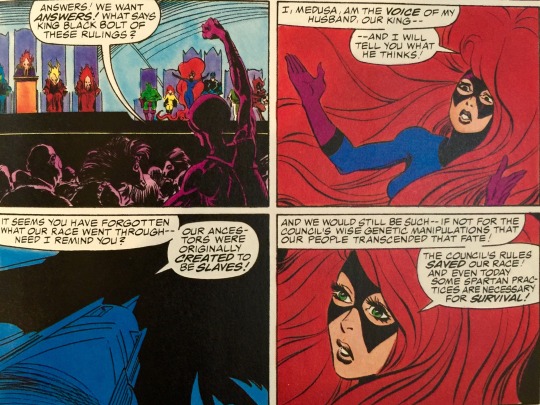
To further appease the crowd, Medusa announces to the court her news that their king is soon to have an heir. The court is overjoyed by this news. The prospect of a royal birth seems to quell their angry feelings and reinvigorate their appreciation of the pomp and circumstance of tradition and the monarchy.
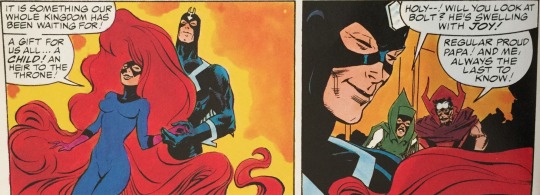
The genetic council, meanwhile, do not share in this celebration. The council themselves are depicted as doddering old men, feeble and ineffectual. Their leader, however, The High Chancellor, is shown as sharp, cruel and stern. He is unwavering in his adherence to the customs of Attilan as well as ambitious to consolidate power and essentially usurp Black Bolt as the supreme authority over Attilan. He is only identified as The Chancellor throughout the story, but is later given the name Kitang in subsequent appearances. Kiting seizes on Medusa’s announcement as an opportunity to further cement his power.
Chancellor Kitang states that Medusa’s pregnancy cannot be allowed to come to term. There is far too much risk. The destructive nature of Black Bolt’s power, coupled with the madness of his brother, Maximus, could lead the child of Black Bolt to be too great a threat to the safety and wellbeing of Attilan. Kiting decrees that Medusa’s pregnancy be terminated.
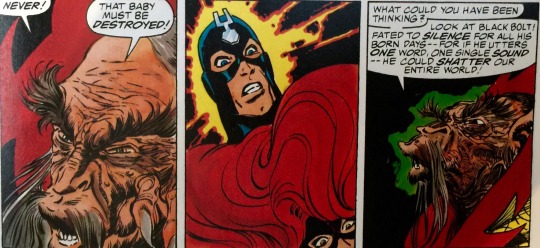
It’s a shocking turn of events. Medusa is horrified and turns to her husband for help. And she is left even more aghast by the look of indecision in Black Bolt’s eyes. He is torn… as much as he loves his wife and desperately wants the child, his duty above all else is to the people of Attilan and Kitang’s ghastly command is not entirely without merit. Heartbroken and enraged, Medusa refuses the orders of the council. She declares that if she is not allowed to bare her child on Attilan then she will flee to earth!
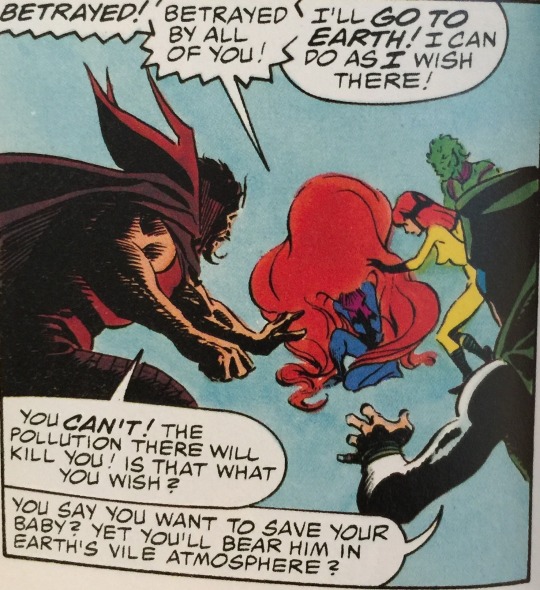
Elsewhere, in the bowls of the city, Maximus the Mad has been left to rot in his prison cell. Word of the scandal that had occurred in the royal court reaches his prison guards and Maximus decides that it has made for an appropriate time to escape. He picks the lock of his cell and then uses his mental powers to force the guards to tear each other to shreds.
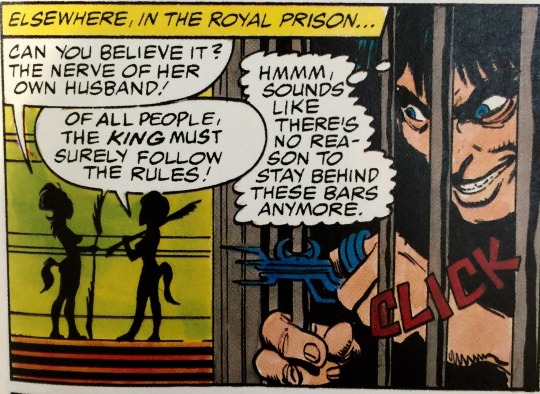
Meanwhile, Medusa’s sister, Crystal, and her husband, Quicksilver, discuss all that has transpired. Medusa has left her husband and fled to earth accompanied only by her handmaiden and doula, Minxi. Quicksilver voices disapproval toward Medusa, calling her selfish for forcing her husband to choose between her and his duties as a king. Crystal is incensed by the remark. The two had only just had their own child and Crystal knows all too well the anguish her sister is going through.
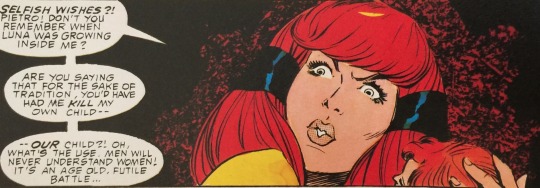
Crystal makes up her mind… she leaves her daughter in their care of the nanny and goes to Lockjaw, the royal watchdog who has the ability to teleport over vast distances and asks of him that he help her and her sister flee to earth. After a short debate, Karnak, Gorgon and Triton agree to accompany Crystal.
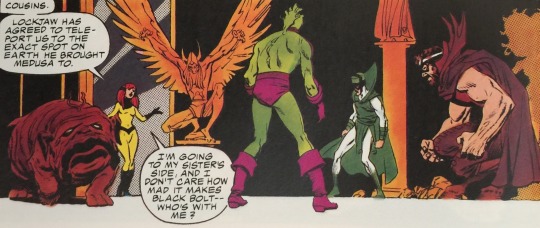
Medusa and Minxi have made their way to earth and taken refuge in an abandoned farmhouse in the desert outskirts of Las Vegas Nevada. The baby inside her is growing at a notably fast pace and its jostles and kicks cause her great discomfort. Minxi tries to ease Medusa’s pain, but there is not much she can do. This is Minxi’s first appearance and she’s a rather interesting Inhuman. Her powers enable her to take on the attributes of any animal she comes into contact with. Minxi is in a romantic relationship with Gorgon, but is also pursued by Karnak. It’s possible that Minxi is the mother of Gorgon’s younger child, Petras… for some reason she has only made a handful of appearances outside of this story.
After a brief stopover in the unwelcoming streets of Las Vegas, Lockjaw teleports Crystal and the others to a commune outside of the city where a collection of hippies and burnouts have set up a home away from the hustle and bustle of modern life. The friendly denizens of this commune direct Crystal to the junk yard down the river where her sister is to be found.
Back on Attilan, Maximus is toiling at a means to transport himself to earth. He plans to go to Medusa and somehow make her his… all part of a bent scheme to hurt his hated brother. Maximus babbles on to himself, a manic stream of consciousness in which Maximus ruminates over his hatred toward Black Bolt, the unwanted brother whom he feels stole from him his sanity, his parents, his rightful place as king. The art and writing works wonderfully here in capturing the unhinged energy bubbling out from Maximus. His darting, squinted eyes and contorted grimaces perfectly mirror the twisted passage of his thoughts. It’s a wild, disquieting scene.
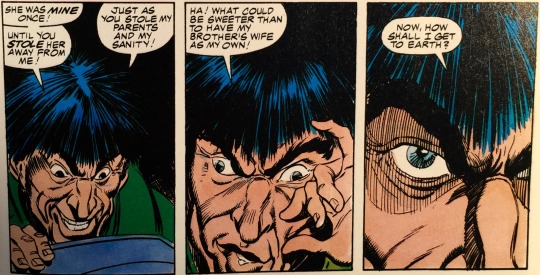
And very neatly paralleled by conjoined scene showing a mournful and stoic Black Bolt sitting silently atop a stalagmite somewhere in the caverns of the moon.

Meanwhile in Nevada, Crystal and other have reunited with Medusa and Minxi. Gorgon does his best to offer solace to Medusa, assuring her that Black Bolt loves her with all his heart. Yet they have more immediate problems to contend with. The polluted atmosphere of earth will ultimately prove fatal to them and surely cannot be healthy for Medusa’s unborn child. Crystal decides to do something about it, claiming that she can use her elemental powers to cleanse the air and soil of pollutants. A lofty undertaking certain not to succeed, but it does provide us a wonderful splash page of Crystal standing atop the home wielding her tremendous elemental powers.
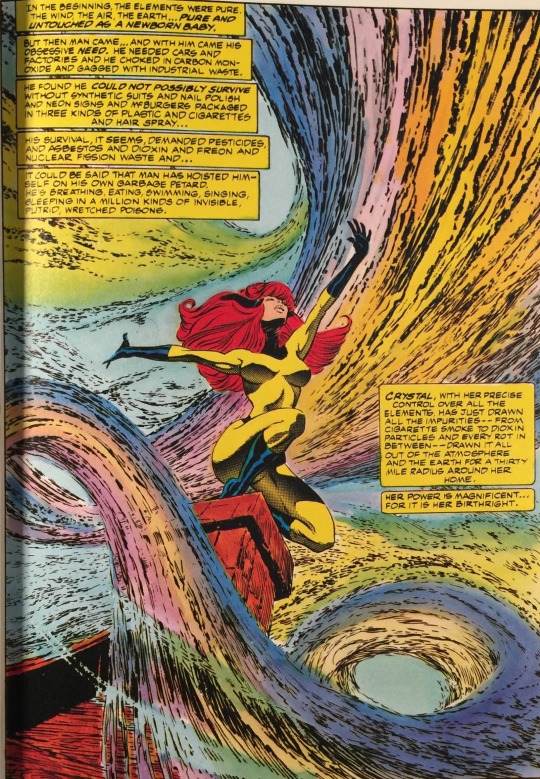
Crystal’s efforts prove temporarily effective and the land around the farmhouse is transformed into a beauteous grove. Karnak is hopeful that the effect will spread, perhaps all of earth might be healed from the ravages of industrialization. Gorgon and Minxi are disconcerted by it all, however, seeming to believe that what Crystal has done will upset the natural order of the planet and bring about costly ruin.
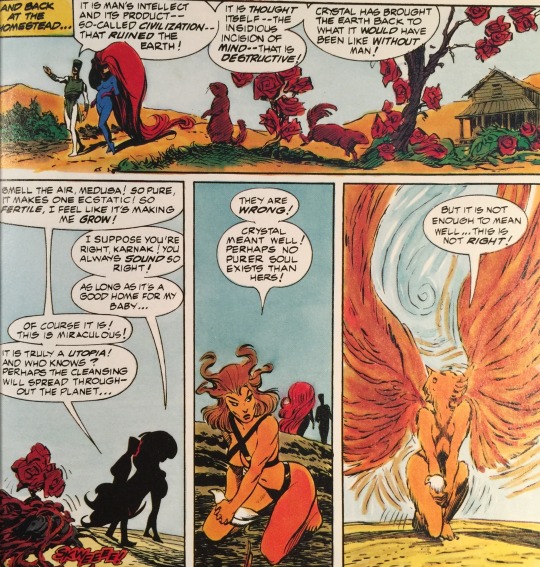
Their instincts are correct. Crystal’s meddling with the environment has stirred to life some unearthly presence, a gnarled personification of nature turned on its head. Water twists with air and sand and burst aflame. Some kind of ‘birth’ has occurred and it can only spell disaster for The Inhumans.
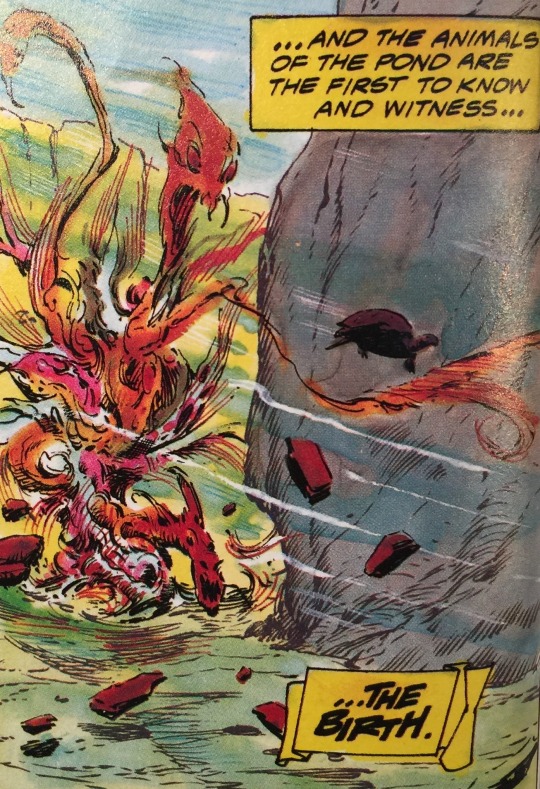
On the moon, Black Bolt continues his solitary vigil. His thoughts turn back to his childhood and the great isolation forced upon him by the awesome responsibilities of his powers. His voice can bring about utter destruction and he must forever remain silent. The repetitive mantra of ‘never speak’ reverberates through his head on a constant loop. In this meditation, Black Bolt’s mind is touched by the psychic consciousness of his unborn son.
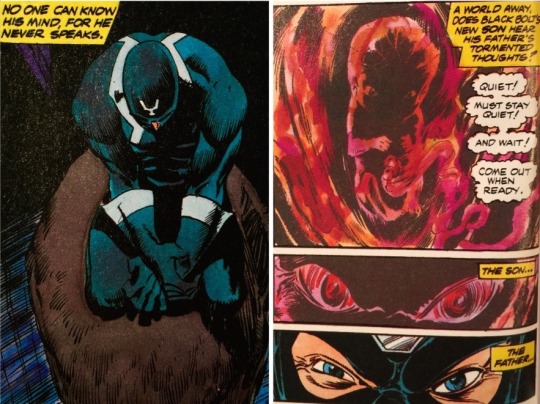
Maximus has made his way to Nevada, using his technological ingenuity to track the others whereabouts. He plans his strategy as he goes along, deciding to use his own madness as a weapon. His revenge against his brother will be to drive Medusa insane.
As the threats of Maximus and the strange creature born from Crystal’s tinkering loom, the narrative offers a series of brief vignettes for each of The Inhuman Royals. Triton harbors at the bottom of a lake, curled up in the fetal position while considering his feelings of alienation and sadness. He yearns for both the company of others as well as solitude and cannot find solace in either. Elsewhere Karnak prattles on his philosophical ramblings, expounding on the follies on both human and Inhuman. His garrulous pontifications all clearly attempt to distract him from his heartache over Minxi. Crystal sits in a bath, ruminating over her guilt over leaving her husband and daughter behind to tend to Medusa. Gorgon, meanwhile, warms himself next to a fire, sharing the drink and company of hobos and call girls. Karnak chastises Gorgon for his hedonistic ways, but Gorgon has had enough of Karnak and his words. He craves simplicity. Girls make him feel good, Karnak’s rhetoric makes him feel bad.

Finally, Medusa wanders about the farmhouse fretting over an uncertain future and all that she has lost. She thinks back to her time as the black sheep of the Royal Family, her former role as a villain in the human world and, most importantly, how Black Bolt forgave her ever transgression and accepted her for who she was. She misses him so desperately and stunned and overjoyed to see him enter the room and call out to her. But it isn’t Black Bolt, it’s Maximus using his mental powers to trick her. He reveals himself and tortures her with harsh words and unwanted advances. Medusa rebuffs him and as a final cruelty Maximus attempts to gaslight her, disappearing into the haze and claiming to be nothing more than a manifestation of Medusa’s guilty consciousness.
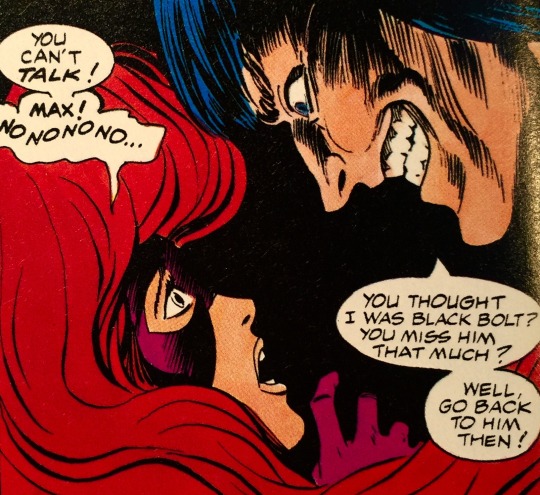
The others return to the farmhouse, yet the quiet they bring with them only lasts for a moment. Unnatural winds hits the house like a gale, evacuating them from, the premises. Night turns suddenly to day and all of nature turns on its head. A grotesque monstrosity of sand and bark, fire, flora and bone rises up before them, towering in an elemental maelstrom. It’s absolute mayhem and with all their powers aside the Inhumans are tossed about by the monster as though they were mere rag dolls.
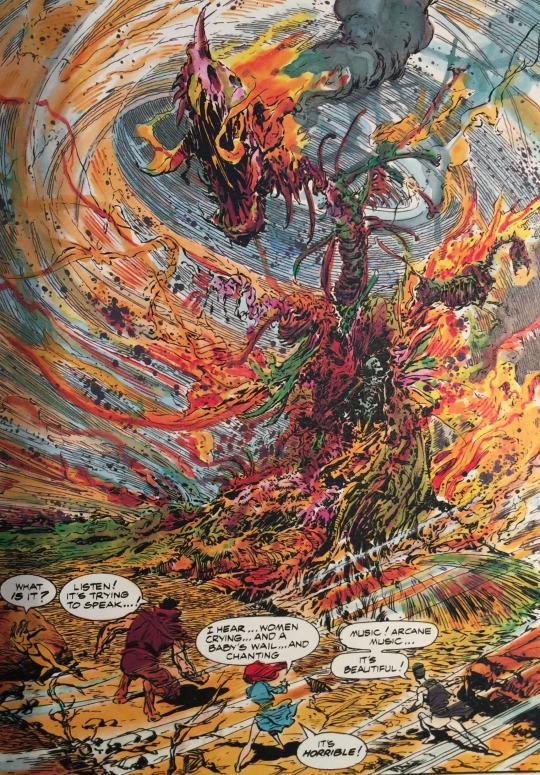
Somehow Karnak is able to discern the monster’s weakness and he devises a plan of attack, issuing commands to the others. Minxi distracts the monster while Gorgon slams his hoofed foot into its weakest point. Now vulnerable, Crystal is able to use her elemental powers to pull the monster apart and it shatters into countless pieces.
The Inhumans have prevailed but the stress of it all has sent Medusa into labor. The child is coming and the others rush to her aide. They are each terrified that the child will be born with its father’s sonic powers, that its initial cry will destroy them all.
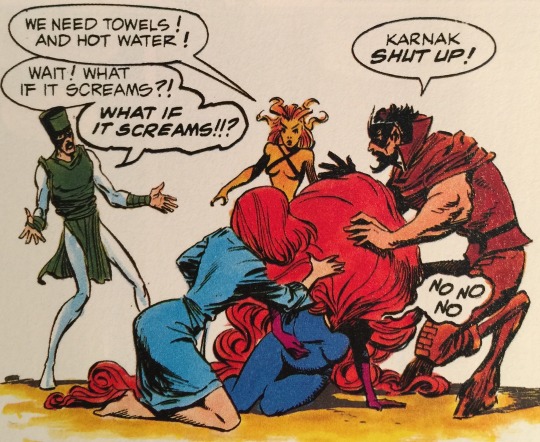
Minxi assists Medusa in the birth. The entire scene is interspersed with events occurring elsewhere showing Maximus flying into a manic, hallucinatory rage and accidentally killing the kindly old man he had befriended. It’s all a truly bizarre intersection of birth, life, murder and death… a jumble of human elements not that different then the composite monstrosity that has attacked the inhumans in the scene beforehand.

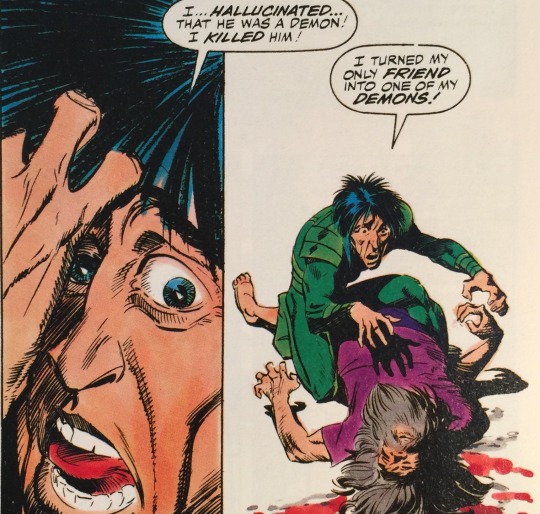
Medusa gives birth to a healthy baby boy. He doesn’t stir nor cry. He is merely calm and content and gently goes to sleep. All seems quiet; the danger appears to have passed. Crystal and Karnak surmise that the monster they dispatched must have been some manifestation of imbalance caused by Crystal’s attempts to alter the earth. They are only half correct, for the creature has not been destroyed and it is slowly reflecting itself, preparing to attack again.
It singles out Medusa, attacking her when she is alone with her son. A particularly haunting scene shows the monster taking on the form of animated water, spindling through the air and attempting to drown Medusa in her sleep.
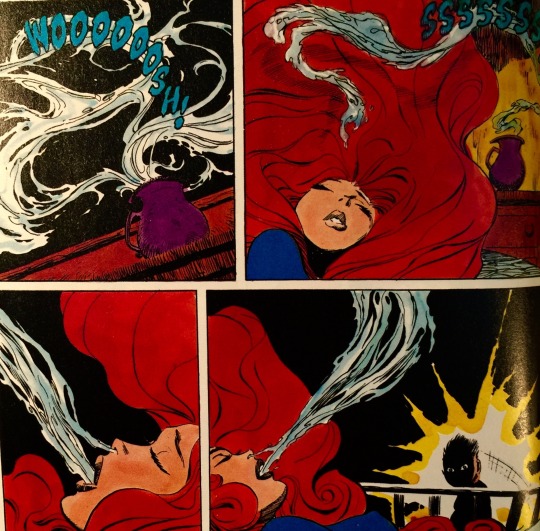
She wakes up, coughing the water from her lungs. She sees the creature before her and at first she assumes it is but a hallucination, a visage of her guilt and sorrow. She soon realizes, however, that the creature and the danger it represents are indeed quite real.
The others are alerted by Medusa’s screams. Whatever weakness the monster once possessed is now gone and the Inhumans are quickly routed by the circling torrent of fire, water and moss. As an added bonus, The Inhumans all fight in their underwear. Medusa runs off with her son, but is struck by a branch, forcing her to lose hold of the baby.
Triton is terribly wounded by a lightning bolt of fire. Lockjaw sees how critically Triton is injured and, not knowing what else to do, teleports them both to Black Bolt on the moon. Black Bolt takes up his cousin in his arms. He must wonder what does this all mean? In any case, the look in his eyes makes it abundantly clear that he knows he must get to earth.
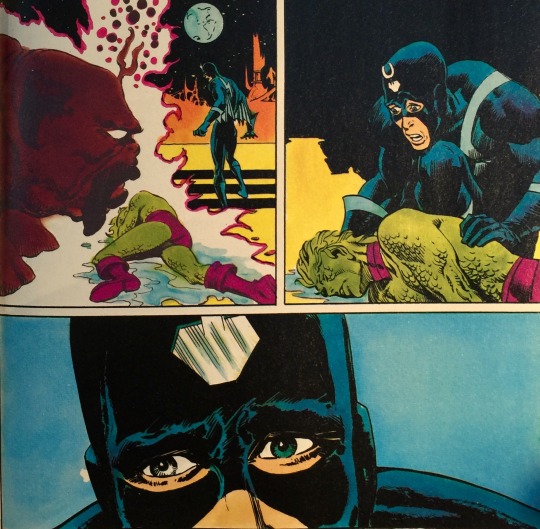
Crystal, Karnak and the others are unable to defeat the creature. His mother knocked unconscious, the baby is left on his own and he crawls toward the beast. The two newborns square off against one another. The monster seems to sense the innocence in the baby whereas the baby sense his own powers. A crackling psychic energy emits from the child’s mind. His first cry focuses this power into a singular blast. An enormous explosion engulfs the creature, tearing it asunder and completing destroying it.
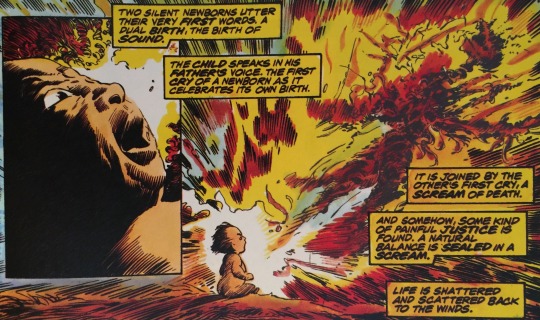
In the aftermath, Medusa wakes up instantly calling for her baby. Crystal comes quickly and hands Medusa her unharmed child. None had seen how the child had destroyed the monster, yet Medusa can see something in her sons eyes and can only suspect the power he may possess.
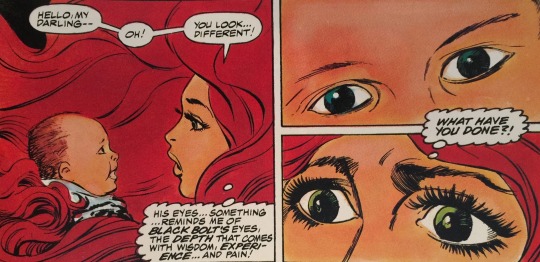
Later, in a final act of malice Maximus returns to bedevil Medusa. He feigns sympathy and compassion, assuring Medusa that the council will certainly see how pure and innocent the baby is and welcome her back to Attilan with open arms. All the while believing that the council will sentence the child to death and, by convincing Medusa to return, Maximus may finally have his vengeance. And with that Maximus again disappears.
Outside, Crystal, Karnak and Gorgon ponder all that has transpired. They are each left feeling quite inhuman. Their efforts to cure the planet resulted in a monstrosity. The plant seems to have rejected them and perhaps it is time for them to leave it and humanity behind. Suddenly, Crystal notices that Lockjaw has returned from the moon. They each know that Black Bolt has finally found them.
Back in the farmhouse, Black Bolt approaches his wife and newborn son. The meditation Black Bolt had subjected himself has cleared his mind and set straight his priorities. He embraces his wife and then takes his son up in his arms. The pure joy and pride on his face is unmistakable and Medusa dares to hope that she and her husband may once again know happiness.
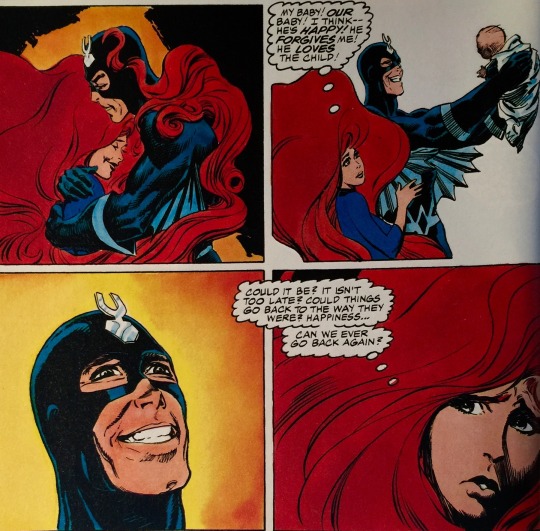
They all return to Attilan on the moon. There, the child of Medusa and Black Bolt is presented to the Genetic Council. Medusa claims the child is innocent and pure, castigating the council for ovations that such purity needed to be snuffed out. Chancellor Kitang is unmoved. One life against the traditions, history, and safety of Attilan… innocent or not, it is but ‘a feather to the mountain.’
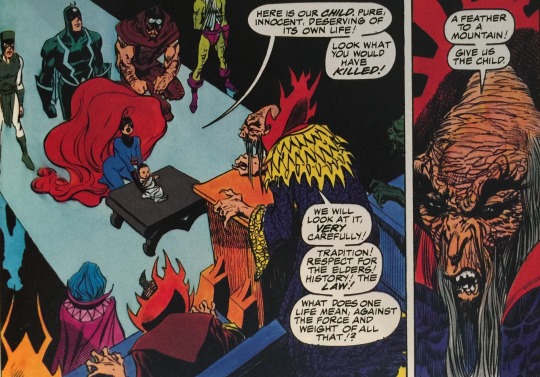
Kitang orders that the baby be taken into the care of the council so that their doctors and scientists may look him over and ensure he poses no threat to Attilan. Black Bolt and Medusa have no choice but to comply.
Karnak contemplates aloud to Quicksilver. The conviction of his condemnation toward the rituals and customs of Attilan has been replaced with uncertainty. In his view the council is rotten, mired in traditions the meanings for which have long since been lost and forgotten. All that remains is the cruelty, but perhaps the meaning and purpose remains nonetheless. Perhaps there is wisdom to it all and there may indeed be reason to fear the son of Black Bolt. Quicksilver waves the matter off as mere morbidness.

In the end, Medusa and Black Bolt are left to wait in silence, the future of their child and happiness unknown. All the while Maximus cackles in his cell. He had gleefully turned himself in now he too waits patiently. Waits for a nephew who will have his blood and his madness, whom Maximus will use gain his final revenge. He laughs once more, exclaiming how much he loves a happy ending.
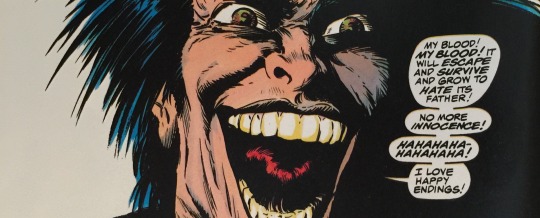
It’s a wild, wild weird read.
The whole tale plays out like some mad Shakespearian fever dream. The dialogue is steeped with near hysterical melodrama and hyperbole. The themes are presented with the subtly of a sledgehammer and the narrative takes itself all too seriously. It’s just nuts… and I love ever single page of it!
It’s impossible for me to truly look at this story without the rose-tinted hue of youthful memory. I was about twelve or so when I first read the graphic novel. It was my first exposure to The inhumans and I was entranced from the get-go. It was like Star Wars and X-Men, Frank Herbert’s Dune and the Lion The Witch and The Wardrobe… all wrapped up into a singular comic with stunning illustrations and weird, wild ideas that just blew my mind.
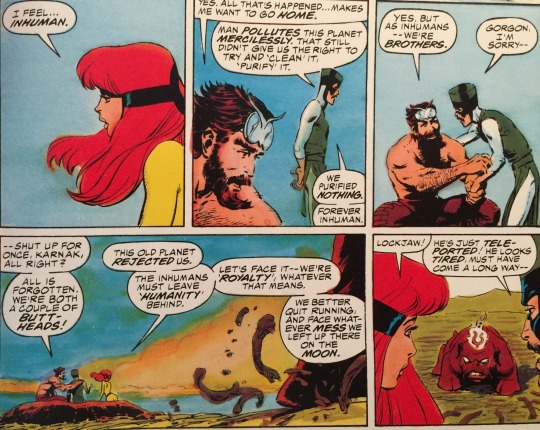
It was also 1992 and I was a kid being raised by two socially minded lawyers. Here in the states, The Supreme Court had just adjudicated the case of Planned Parenthood v. Casey, altering important facets to the original parameters put forth in Roe v. Wade. The country was once again embroiled in a national debate over abortion, right to life, and a woman’s right to choose. All this was a really big deal in my household and, while I agreed with my parents and admired their passion, my 12-year-old brain couldn’t quite grasp the entire scope of the matter.
Once again, comics came to the rescue…
By my interpretation, By Right of Birth is very much a pro-choice story. It turns the matter a bit on its head by framing the villains as advocating for a pregnancy to be aborted and the hero as fighting for the right of her unborn child, and yet, at its heart, it is about a woman’s unmitigated right to make choices about her own body.
A woman’s right of choice, after all, is a bilateral process. To the same extent that a woman has the right to terminate a pregnancy so too does she has the right to take it to term. What is imperative is the right to choose and a governing body has no business in the decisions that women make with their families. And this is ultimately what Medusa and the others are fighting for…
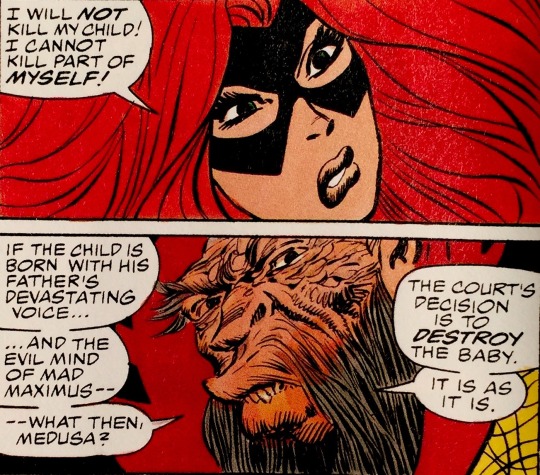
The late 80’s and early 90’s were also times in which the matter of ecological peril was really germinating in the collective consciousness. Many were coming to more fully realize that mankind could have a lasting detrimental effect on the health of the planet. In 1989 the Montreal Protocol on Substances that Deplete the Ozone Layer was ratified and it really hammered home just how serious this problem was.
The looming dread of ecological peril is also a central theme in By Right of Birth; and once again the narrative takes on the matter from an interesting and unusual direction. The monster that was created was a product of Crystal trying to fix the damage done to the environment. It seemed as though Crystal’s efforts for a ‘quick fix’ brought about more harm than good.
It is not by accident that the narrative depicts the elemental monster as being akin to a newborn. It ties into the overarching theme of the potential for destructiveness inherent in our prodigy (whether that prodigy be an actual child or the effects brought about rapid industrialization). It’s similar to Mary Shelly’s Frankenstein. When we play god we gamble with the risk that our creation will end up destroying us.
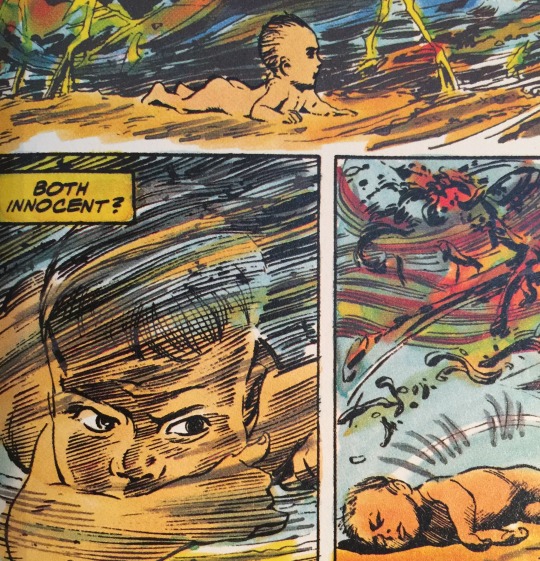
Attilan and the Genetic Council makes this same gamble with their adherence to eugenics and attempts to control the bloodlines of this citizenship. They only obtain the illusion of control… an illusion that helps them push down the crippling fear that their constant tinkering with the Terrigen Mists is very likely to produce an Inhuman who will destroy them all.
Eugenics is a junk science. It’s a neat matter to explore in the confines of science fiction, but will never work in the real world; and all too often it has been embraced by deplorable, racist causes.
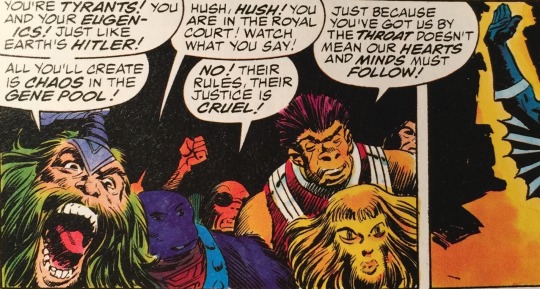
And yet modern medicine stands on the precipice of a new type of eugenics with prenatal genetic screening and the prospect of genetically modified babies. Advancements to these ends may succeed in ultimately eradicating terrible diseases like Tay–Sachs or Huntington’s chorea, but what if the process is taken further? Will geneticists attempt to target less concrete afflictions like depression, anxiety, or autism? Might this inadvertently rob from the future generations many of the qualities that makes humans human? It’s impossible to say, but nonetheless a terrifying prospect.
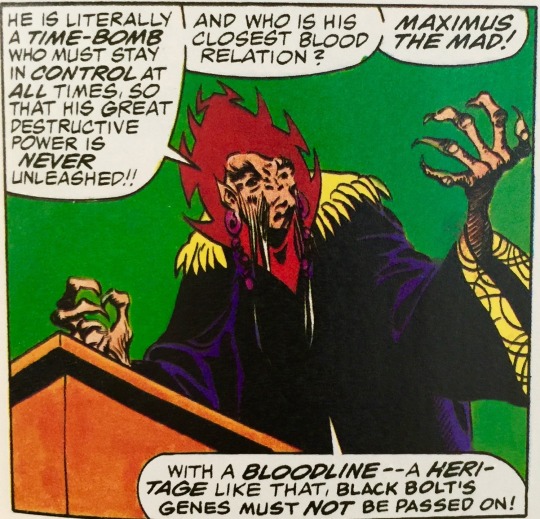
All of its melodrama notwithstanding, By Right of Birth chooses not to answer many of the overarching questions that the story posses. Medusa and Black Bolt’s son is not named and no indication is offer as to whether or not he will grow up to actually pose a threat to Attilan.
Subsequent stories show that the son is named ‘Ahura.’ And while Ahura has indeed been a troubled youngster he has by no means represented the danger that the Genetic Council feared he would. Like his father, Ahura is an extremely powerful Inhuman, yet what has bedeviled him has not been his power, nor the madness that afflicts his uncle Maximus, rather it is has been the psychological trauma inflicted on him by being separated from his parents. The sadness and acting out this trauma evoked in Ahura was initially misidentified as a sign of more deeply seated psychopathology.
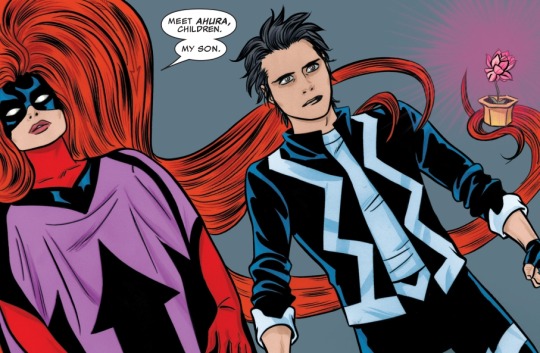
Fortunately, things eventually worked out for Ahura and he has enjoyed a somewhat more healthy young adulthood. Interestingly, the hardships that Ahura has endued has had nothing to do with his powers and genetic heritage and everything to do with the fear of what he might have become.
A brave, unflinching and unapologetic tale as well as a wild, hugely enjoyable ride. Highest possible recommendation for Inhuman fans and fans of the comic book medium in general. Five out of Five Lockjaws!


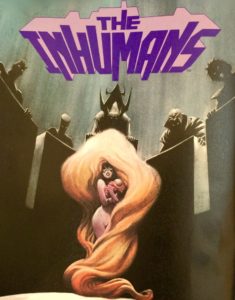
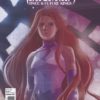 Inhumans: Once and Future Kings #2 Review (spoilers)
Inhumans: Once and Future Kings #2 Review (spoilers) Inhuman covers from Marvel’s March Solicitation
Inhuman covers from Marvel’s March Solicitation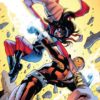 Ms. Marvel #34 review (spoilers)
Ms. Marvel #34 review (spoilers)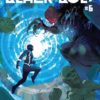 Black Bolt #6 Review (spoilers)
Black Bolt #6 Review (spoilers)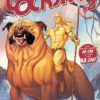 Lockjaw #2 Review (spoilers)
Lockjaw #2 Review (spoilers)